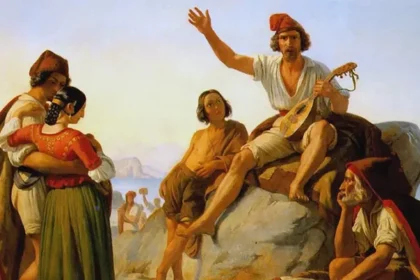Rewriting Pakistan’s Textbook: The story of Pakistan’s formation is not just written in blood and ink; it has been rewritten in silence. History textbooks have played more than a pedagogical role in Pakistan — from the early decades of nation-building to the post-1977 Islamisation campaign, history textbooks have been a tool of ideology. Designed to consolidate power and cement a singular national identity, these texts have consistently erased alternative voices — minorities, women, labourers, and dissenters, who shaped the very soil they’ve been written out of.
A growing chorus of educators and scholars today is pushing back against this trend. Among the most important recent interventions, “Towards People Histories in Pakistan” is a compilation of essays that reveals the ruptures and gaps in the official memory of the country. This article is based on this text and other scholarly literature that explores how school curricula in Pakistan have been politically weaponised over a long period and how a new vision of the past, created using reclaimed archives and suppressed histories and held within their memories, may hold a more truthful future.
Myth-Making Under Ayub Khan
Three radical changes to the Pakistani curriculum took place in the reign of Field Marshal Ayub Khan (1958-1969). His government did not aim for political centralisation only; it wanted to control the narrative. After the war of 1965, the Ayub government, through the Curriculum Wing of the Ministry of Education, initiated the rewriting of history in line with the interests of the state. The narrative behind the origin of Pakistan, which was hitherto based on a political and social background, now came to be redefined through the prism of martial conquest, Muslim victimhood, and deliverance through divinity.
This approach has been criticised consistently by a historian, Dr Mubarak Ali. The curriculum in the Ayub era, according to him, started to glorify battles and heroes and boast the social, economic, and political conditions that made it; those conditions were erased from the curriculum. The Indo-Muslim encounter was reduced to a clash narrative, and the past was reduced more to a simplification — fewer people, but in terms of power.
Zia-ul-Haq’s Islamisation of the Past
The ideological groundwork laid in the 1960s reached its zenith during General Zia-ul-Haq’s rule (1977–1988). Zia’s military regime did not merely amend textbooks; it restructured the very purpose of education. The 1981 National Education Policy and Implementation Programme declared that curricula must reflect “the ideology of Pakistan” — a phrase that was never clearly defined but frequently invoked to justify religious conformity and political loyalty.
Zia’s policies produced a curriculum that valorised jihad, demonised India and non-Muslim citizens, and infused Islamic symbolism in every subject, from science to social studies. Reports by the Sustainable Development Policy Institute (SDPI) have detailed this process. A 2006 SDPI report titled The Subtle Subversion highlighted how textbooks in Punjab and Sindh during and after Zia’s regime glorified war, distorted Partition, and promoted narrow religious narratives at the cost of historical accuracy. Textbooks taught during this era presented the creation of Pakistan not as a political struggle but as a sacred mission. The complex socioeconomic reasons behind Partition including class, land
politics, and colonial structures were omitted in favour of religious justification. These omissions had lasting consequences.
Silencing the Margins
People whose histories remain untold have paid the price of such ideological formation. The discourse on education in Pakistan seldom addresses the cultural and political aspects of the Baloch, Sindhi, Pashtun, and Seraiki groups. Through a Punjabi-Urdu prism, the overarching discourse portrays national history as a linear, monolinear progression of Muslim monarchs and Urdu-speaking elites. Tariq Rahman, a linguist, has demonstrated in his book “Language and Politics in Pakistan” how state policy favoured Urdu over regional languages, further eliminating cultural diversity in the historical record.
Discrimination of religious minorities has been more explicit. A 2016 report by the National Commission for Justice and Peace (NCJP) recorded how even the textbooks still placed Hindus and Christians in supporting positions and relegated them to outsiders or even enemies of the state. This image remains persistent, despite Article 22(1) of the Pakistani Constitution, which ensures religious freedom and protection against religious indoctrination in state-owned institutions.
Women, too, remain conspicuously absent from most textbooks. While figures like Fatima Jinnah or Rana Liaquat Ali Khan occasionally appear, their presence is symbolic rather than substantive. Feminist scholars, such as Rubina Saigol, have long argued that curriculum reform is essential to foregrounding the role of women — not as passive supporters but as agents of political change, grassroots mobilisation, and intellectual leadership.
Towards Peoples’ Histories: A New Archive of Memory
In this atmosphere of omission and distortion, Towards Peoples’ Histories in Pakistan arrives as both a corrective and a challenge. The volume, featuring contributions from Anam Zakaria, Ali Usman Qasmi, Ammar Ali Jan, and others, offers a framework for rethinking how we teach the past. It urges historians and educators to look beyond textbooks and into oral traditions, folk histories, survivor testimonies, and community archives.
One example is that Zakaria breaks down the state-supported narratives with experiences in the chapter on Partition survivors. She has trapped trauma instead of triumphalism. She publishes not traditions of black-and-white morality, but tales of friendship between borders, duplicity and survival. These are the memories which are lost by textbooks, as they are not easily instrumentalised.
Ammar Ali Jan’s contributions validate the acceptance of class struggle and labour histories. He studies the contribution of the peasants, workers, and student movements in the democratic culture of Pakistan, who, instead of becoming part of the official history, were denied due to their narratives, which could prove to be instrumental in critiquing the power of the elites. The stories do not suit the heroic type — nor are they unnecessary to a fair reckoning of the past.
Curriculum Reform: Between Promise and Resistance
Recently, educational reform has once again become a topic of national debate. The Single National Curriculum (SNC), introduced by the Pakistan Tehreek-e-Insaf (PTI) government in 2020, aimed to standardise education across public and private schools. But instead of diversification, critics argue that the SNC reasserts majoritarian and religious narratives while offering little space for critical thinking.
A 2021 critique by the Human Rights Commission of Pakistan noted that the SNC “appears to reinforce conservative biases” and may further marginalise already under-represented communities. Despite promises of inclusivity, textbooks under the SNC have faced backlash for downplaying religious diversity and reinforcing gender stereotypes. True reform would require more than policy documents. It would need political will, scholarly independence, and a radical openness to multiple truths. It would mean trusting students not with a single national myth but with the tools to think historically, ask difficult questions, and recognise voices previously unheard.
Reclaiming the Past to Reimagine the Future
To erase history is to erase possibilities. The past, if constructed narrowly, locks us into rigid identities and binary worldviews. But if opened, through memory, plurality, and contradiction, it offers the chance to see ourselves in a different light.
What Towards Peoples’ Histories in Pakistan and other such efforts insist upon is simple: history belongs to the people. It must account for their grief and joy, their labour and resistance, and their language and beliefs. To teach history is not to glorify the state. It is to cultivate critical citizens. Pakistan’s textbooks have long reflected the anxieties of the powerful. Perhaps it is time they began reflecting the lives of the many.













